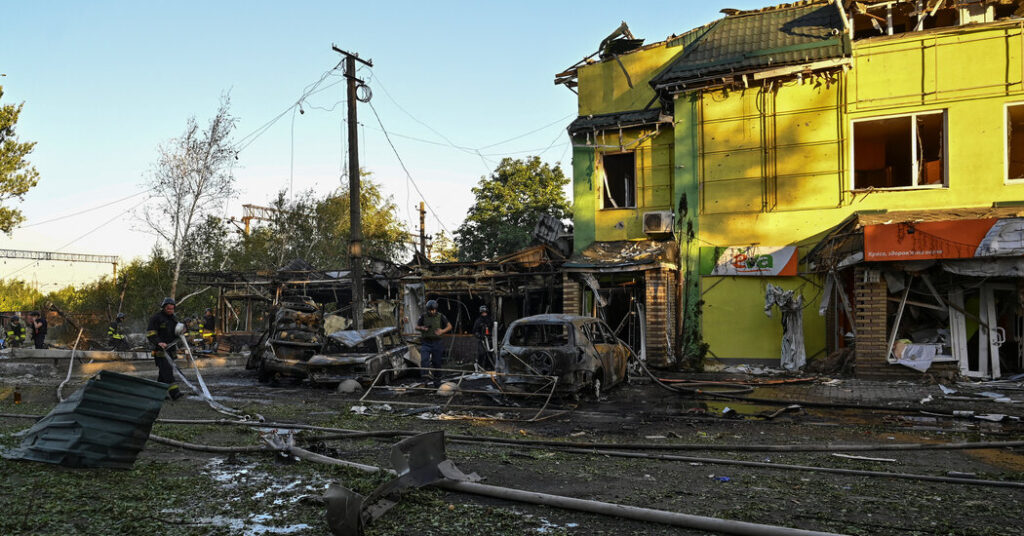A Russian missile attack on a town in southeastern Ukraine and the subsequent raging fires killed at least seven civilians, including three children, Ukrainian authorities said on Sunday as they investigated the death toll from two days of intense Russian attacks.
Yuriy Borzenko, chief doctor at the Zaporozhe Regional Children’s Hospital, said in a telephone interview that in addition to the victims, dozens of people were receiving treatment for wounds after the attack, including one Pregnant woman and five 14-year-old girls.
Dr. Bolzenko said the girls were out walking together in the afternoon sun when shell blasts ripped through the town center and flames engulfed shops, cars and homes. One of the girls had shrapnel embedded in her skull and was in a coma, “still between life and death,” he said.
“Her parents were in really bad shape, I just saw them,” he added.
As attacks rained down, Ukrainian President Volodymyr Zelensky renewed his call for restrictions on the use of U.S. ATACMS long-range missiles to be eased so that Ukraine could target Russian warplanes from air bases before they bomb.
“Long-range strikes and modern air defense systems are the basis for stopping daily terrorist activities in Russia,” he said in a statement on Sunday, accompanying a video purportedly showing the aftermath of one of the week’s worst attacks.
The attack in Vilniask was one of a series across Ukraine that has killed at least 24 civilians and injured dozens more since Friday night, according to local officials and emergency workers.
Also on Saturday, nine people were killed in Russian shelling in a frontline village in Ukraine’s eastern Donetsk region, local officials said. At least six other people were killed in shelling on Sunday morning, officials added.
Three powerful guided bombs dropped by Russian warplanes exploded in the town of Delhachi in the northeastern Kharkiv region on Saturday, hitting five multi-story apartment buildings, Ukrainian officials said. There were no reports of deaths, but two elderly men were reportedly hospitalized with shrapnel injuries.
Emergency services said the Russians struck Kharkov on Sunday night with another guided bomb, hitting the postal service Nova Poshta. The bomb exploded in a residential area, killing at least one person and injuring at least nine others, including a postal driver.
Zelensky said on Sunday that Russian warplanes had dropped about 800 powerful bombs containing hundreds of pounds of explosives over the past week.
A 67-year-old man in the southern Kherson region was killed in one such attack, although the Ukrainian air force said it shot down 10 Russian drones on Saturday, local officials said.
A Russian missile also hit a high-rise apartment building in Dnipro, central Ukraine, on Friday night. After days of scouring the rubble, rescuers said on Sunday that one person was confirmed dead and two others were missing.
About 48 hours later, on Sunday evening, a missile was shot down over the capital, Kiev, and fragments fell into an apartment building, city officials said. There have been no reports of casualties.
All of the attacks, which took place within 48 hours, were reported by phone from local officials, national police, emergency services and local hospitals. The aftermath of many of the attacks was captured on video by Ukrainian news media, but these were only a few of the attacks per day. part of the event.
As Russian forces ramp up frontline attacks, they continue to exploit gaps in air defenses to launch attacks across Ukraine with the goal of draining the country’s resources, damaging its economy and damaging its public spirit.
The total number of civilians killed in June is unclear, but May was the deadliest month for civilians in Ukraine in a year, according to the U.N. human rights monitoring mission.
Investigators accompanying the mission reported that at least 174 civilians were killed and 690 injured in conflict-related violence that month.
The rising death toll coincides with continued bombardment of Ukraine’s power grid, challenging life for millions of residents who endure hours of scheduled blackouts every day.
Ildar Salieev, the head of DTEK, one of Ukraine’s major private power companies, said in a statement that Russia regularly attacks thermal power plants across Ukraine, causing the loss of 90% of their power generation capacity.
“Due to the scale of the damage, repairs will take years, not months,” Saliyev wrote.
Ukrainian officials have been trying to prepare the public for what could be another difficult winter, and they have been calling on international allies to speed up the delivery of air defense systems to limit further damage and save lives.
Even in the best-case scenario – where there is no further significant damage to the grid – energy officials say Ukrainians should prepare for widespread blackouts during the winter.
Serhii Kovalenko, the head of Yasno, another private energy company in Ukraine, said that as winter approaches, the energy system looks set to run into serious daily deficits.
“If critical infrastructure is repaired and remaining supply is then distributed, consumers could face a 50% deficit,” he said in the statement. “Consequently, the base forecast is for a 12-hour outage.”
Anna Lukinova Reporting from Kiev. Natalia Novosolova Contributed research.

